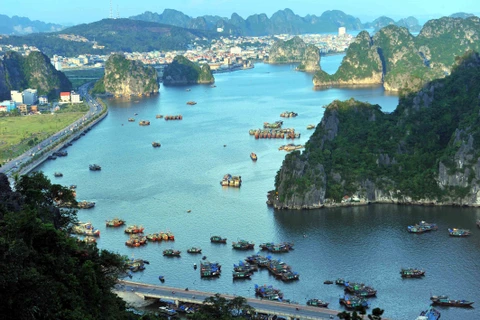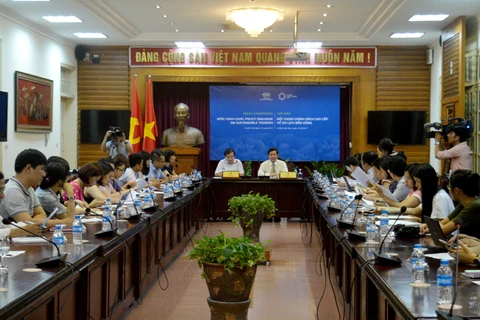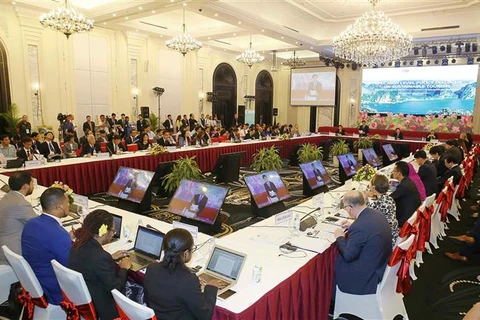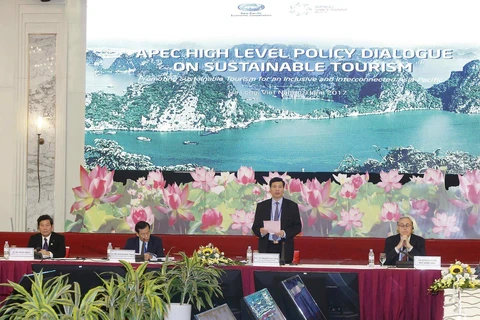 Vietnamese Deputy Minister of Culture, Sports and Tourism Huynh Vinh Ai (centre) speaks at the event (Photo: VNA)
Vietnamese Deputy Minister of Culture, Sports and Tourism Huynh Vinh Ai (centre) speaks at the event (Photo: VNA) Quang Ninh (VNA) - Member economies of the Asia-Pacific Economic Cooperation (APEC) Forum adopted a statement on sustainable tourism development during the APEC High Level Policy Dialogue on Sustainable Tourism held in the northeastern province of Quang Ninh on June 19.
Deputy Minister of Culture, Sports and Tourism Huynh Vinh Ai told reporters that the statement has a significant meaning and delivers a message of strongly supporting principles and actions to promote sustainable tourism. Under the statement, APEC member economies acknowledged sustainable tourism development is a continuous process that requires constant impact monitoring.
They agreed to foster regional and domestic tourism policies that support the United Nations Sustainable Development Goals (SDGs) and encourage viable, long-term economic contributions of travel and tourism in providing socio-economic benefits to all stakeholders.
The APEC members suggested respecting socio-cultural authenticity of host communities, conserving their built and living cultural heritage and traditional values, and contributing to inter-cultural understanding and tolerance.
It is also recommended making optimal use of environmental resources that constitute a key element in tourism development, maintaining essential ecological processes, conserving natural features and resources and biodiversity, and creating competitive and enabling environments for all tourism-related enterprises, and particularly micro-, small- and medium-sized enterprises.
The bloc proposed conducting further studies to enable APEC member economies to apply new advanced technologies for smart, sustainable and inclusive tourism development, especially in tourism human resource development and tourism management.
The APEC High Level Policy Dialogue on Sustainable Tourism is an initiative of Vietnam in order to realise the APEC Strategy for Strengthening Quality Growth and implement one of the four priorities of APEC cooperation in 2017 – which is promoting sustainable, innovative and inclusive growth. It is also a major contribution to the International Year of Sustainable Tourism for Development set by the United Nations.
Tourism cooperation among APEC members officially began in 1991 with the establishment of APEC Tourism Working Group. In 2000, the APEC Tourism Charter, an important document providing long-term direction for the APEC tourism cooperation, was adopted at the first APEC Tourism Ministerial Meeting in the Republic of Korea.
In 2016, Vietnam hosted the fourth APEC Tourism Ministerial Meeting in central Quang Nam province’s Hoi An city, which adopted the “Hoi An Declaration on the Promotion of APEC Tourism Cooperation”. The country has also regularly and actively participated in most important activities of APEC tourism cooperation and promoted bilateral ties with APEC member economies.
To date, Vietnam has exempted entry visas for nine APEC member economies and implemented electronic visas for three other countries. Top ten source markets of Vietnam in 2016 are APEC member economies.
Established in 1989, APEC comprises 21 economies, including Australia, Brunei, Canada, Chile, China, Hong Kong, Indonesia, Japan, the Republic of Korea, Malaysia, Mexico, New Zealand, Papua New Guinea, Peru, the Philippines, Russia, Singapore, Taiwan, Thailand, the US and Vietnam.-VNA























